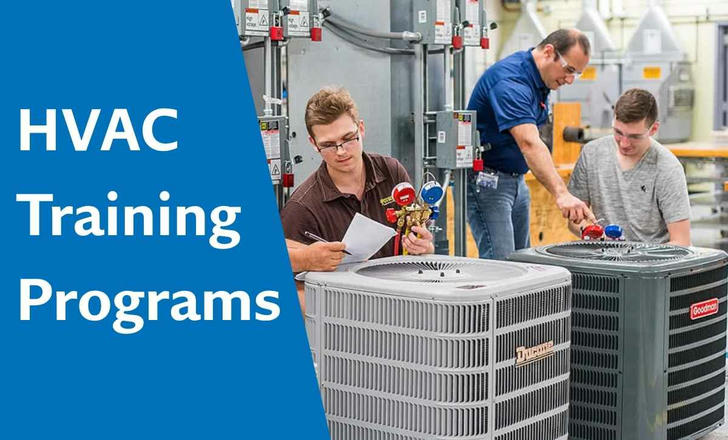HVAC Technician Training in the U.S. (2025): Courses with Finacial Support
Heating, ventilation, and air conditioning (HVAC) technicians install, maintain, and repair systems in homes, businesses, and industrial settings. With growing demand for energy-efficient systems, skilled technicians are in high demand across various regions.

✅ Who Is a Good Fit for HVAC Work?
This career path may suit individuals who:
• Enjoy working with tools and solving technical problems
• Can handle both indoor and outdoor environments
• Are interested in mechanical and electrical systems
• Prefer hands-on training
• Want to develop a practical, in-demand skill set
🧭 Government-Support for HVAC Training in the U.S.
| Program Name | Type | Support Mechanism | Notes |
|---|---|---|---|
| WIOA-Approved HVAC Training | Workforce Program | Tuition assistance via Workforce Innovation & Opportunity Act (WIOA) | Available through local career centers |
| Job Corps HVAC Training | Residential career training | Support tuition fee for eligible 16–24-year-olds | Includes housing, meals, and certification prep |
| Registered Apprenticeships (e.g., UA Local) | On-the-job + classroom training | Wage-earning with employer and union support | Often no tuition burden |
| State Workforce Development Grants | Short-term training grants | Offer cost support via state funds | Varies by state and employment status |
| Community College Workforce Programs | Technical certificate or AAS | Public college subsidies and workforce grants | Offered through accredited institutions |
📚 Recommended HVAC Training Programs
Below are several beginner-friendly HVAC programs available in the U.S.:
| Program | Format | Tuition Range | Certification Included |
|---|---|---|---|
| Penn Foster HVAC Technician Certificate | Online | $939–$1,139 | Yes |
| ABC Institute Residential HVAC Program | In-person | - | Yes |
| SkillCat HVACR Foundations | Online | - | No (Intro Only) |
| Apprenticeships | On-the-job | Varies (Employer Sponsored) | Yes (with exam) |
💼 Career Paths and Salary Expectations
Graduates of HVAC programs often work in roles such as:
• HVAC Installation Technician
• Commercial AC Repair Technician
• Maintenance & Diagnostic Specialist
• Energy Efficiency Technician
According to 2025 data, entry-level HVAC technicians typically earn between $45,000 and $62,000 annually, depending on location and certification.
Beyond entry-level wages, technicians with additional certifications and several years of field experience can see significant salary increases. For example:
• Entry-level HVAC technicians: $38,000 to $45,000 per year
• Mid-level technicians (2–5 years experience): $52,000 to $68,000 per year
• Senior technicians or specialists with NATE certification: $70,000+ per year
In metropolitan areas like New York City or Los Angeles, experienced HVAC technicians with specialized skills can earn upwards of $80,000 annually. Unionized workers also benefit from negotiated wage scales and additional benefits.
🔍 Industry Demand and Regional Job Market Insights
According to the U.S. Bureau of Labor Statistics (BLS), employment of HVAC technicians is projected to grow about 5% from 2022 to 2032, which is about as fast as the average for all occupations. However, regional demand varies significantly. States like Texas, Florida, and California report the highest number of HVAC job openings, partially due to their large residential and commercial construction markets and warm climates that require constant cooling system maintenance.
For example, Texas alone expects over 3,000 new HVAC technician job openings annually through 2030, offering competitive wages above the national median. In contrast, states with colder climates may have seasonal fluctuations but still maintain steady demand due to heating system needs.
❓ FAQ
Q: Can someone with no experience start HVAC training?
Yes. Many programs are designed for beginners and include foundational knowledge in electrical systems and refrigeration.
Q: Is an apprenticeship required?
Not mandatory, but apprenticeships provide valuable hands-on experience and often lead to job placements.
Q: Are there online HVAC training options?
Yes, basic theory can be studied online. However, practical training is typically required for certification and job readiness.
Q: Are there ways to reduce training costs?
Some programs offer scholarships, installment plans, or employer-sponsored learning options. Details depend on the provider.
📌 Summary
HVAC is a practical skill that opens doors to stable employment in residential, commercial, and industrial settings. Choosing a training path that fits personal circumstances can support long-term career development in a growing industry.
1.Penn Foster HVAC Technician Certificate
